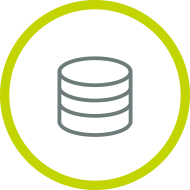AI Agent Integration
MongoDB Services
Tell us about your project.
Applications that handle large volumes of dynamic or unstructured data often benefit from a database system built for flexibility and speed. MongoDB has become one of the most widely adopted NoSQL platforms for this reason, offering a document-based model that adapts well to changing data requirements.
Why Work With Orases?Orases helps organizations design, deploy, and optimize MongoDB environments that support both performance and scalability without added complexity. Our approach supports teams building modern applications that require fast iteration and reliable access to high-volume or schema-less data.

Why MongoDB?
MongoDB uses a flexible document model that allows for faster development cycles alongside simplified data management.
Collections can store varied data structures without requiring a rigid schema, which means changes can be made more easily as applications grow or shift focus. JSON-like syntax, horizontal scaling, and native replication features make it well suited for real-time analytics, product catalogs, user-driven platforms, and content-heavy applications.
Support for sharding, failover, and distributed architecture also makes MongoDB a strong choice for applications with global user bases or large operational footprints. Developers often prefer its intuitive query structure and seamless integration with modern tech stacks.

Orases’ MongoDB Services
Projects that use MongoDB often span multiple application layers, from real-time APIs to analytics engines. Our services are designed to support scalable, maintainable deployments with performance in mind.
MongoDB Architecture Design
We design database infrastructure based on your application’s needs, traffic patterns, and scaling strategy. Whether starting from scratch or refactoring an existing deployment, our focus is on building a structure that performs well and supports long-term growth.
Aggregation Pipelines & Indexing
MongoDB’s aggregation framework allows for powerful server-side data processing. We develop optimized pipelines and indexing strategies that reduce query latency and make real-time reporting more efficient without overloading the system.
Cluster Scaling & Replication
As demand increases, scaling becomes essential. We help configure replica sets and sharded clusters to distribute load, provide high availability, and support fast data access in geographically distributed environments.
MongoDB Atlas Integration
Cloud-hosted deployments through MongoDB Atlas offer built-in scaling, security, and backup features. We assist with Atlas setup, migration, and automation to streamline operations and reduce overhead for internal teams.
Our MongoDB Process
Our development process aligns database design with actual usage patterns and technical objectives.
Contact Us To Find Out MoreData Modeling & Query Planning
We start by analyzing how your application consumes and updates data. This step guides decisions around schema design, document structure, and read/write optimization.
Deployment & Monitoring
Deployment is configured to match your infrastructure, whether it’s a cloud setup, on-premises, or even hybrid. Monitoring tools are added to help track usage trends, alert on any anomalies, and keep performance consistent across environments.
Performance Tuning & Alerts
After deployment, workloads often shift. We conduct ongoing audits and implement automated alerts tied to key performance indicators, helping your system stay efficient even as conditions change.

Frequently Asked Questions
Answers to the questions that’s been on everyone’s mind.
Is MongoDB Secure Enough For Enterprise Use?
Absolutely, when configured properly. Elements such as role-based access, encryption at rest, and secure connections through TLS are standard features that meet enterprise requirements.
How Do You Maintain Performance With Large Datasets?
Index tuning, workload separation, and sharded architectures all help manage large datasets most effectively. We review query logs and usage metrics to adjust configurations over time.
What Is The Benefit Of MongoDB vs. PostgreSQL?
MongoDB excels with dynamic data, rapid iteration, and flexible document storage, while PostgreSQL offers strong relational integrity and advanced querying. The best choice depends on your application’s data structure and behavior.





